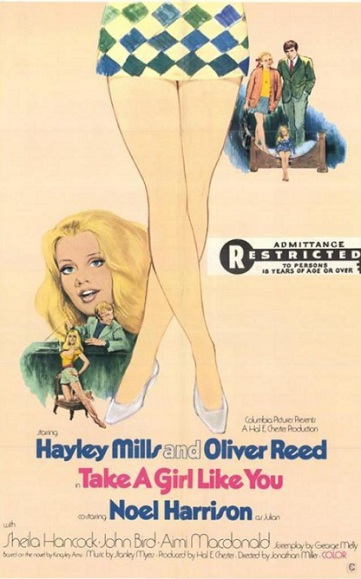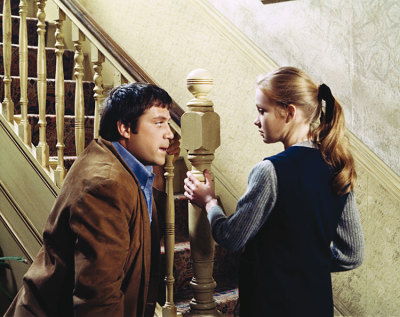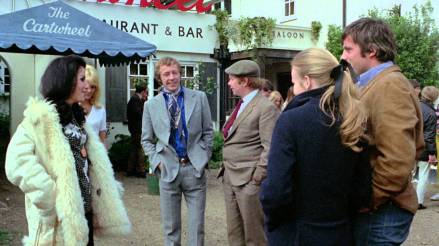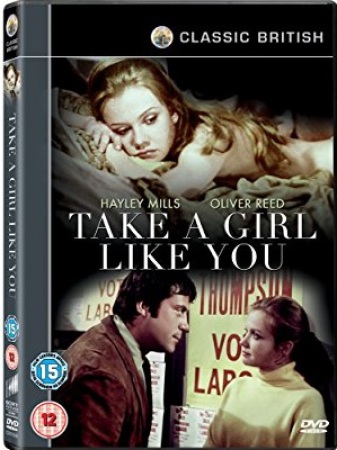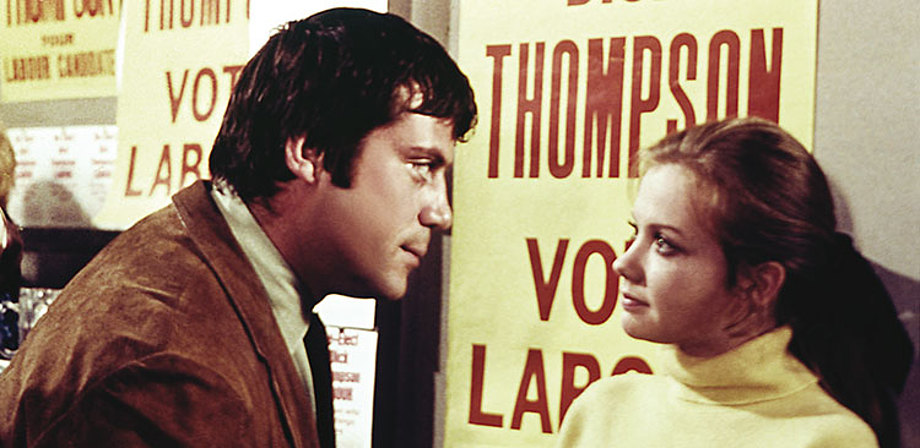
TAKE A GIRL LIKE YOU (1969)
Described on the DVD box as a "sophisticated sex comedy", this 1969 film, starring Hayley Mills and Oliver Reed,poses the question, as it says on the poster - "In this day and age what's a virgin to do?". This extremely unattractive line does not augur well, particularly for modern audiences, but once you get past this element of the story (admittedly the key narrative element) Take a girl like you is a reasonably adult drama which takes a look at the rapidly changing nature of gender roles and sexual relationships at the end of the 60s.
I haven't read the original novel by Kingsley Amis; indeed, I haven't read any of Amis' work, unlike his son's, although I have tried 'Lucky Jim' a couple of times but never got very far with it (and only recenlty sat through the whole film for the first time). This may not be a big disadvantage though as I get the impression from wikipedia that George Melly's screenplay plays fast and loose with the source material. In the film Hayley Mills plays Jenny Bunn, arriving by train from the North in time-honoured 60s film fashion, as the protagonists did in The Knack...and how to get it and Smashing Time etc before her - it was still sufficient it seems in those days to say 'the North', as if there was no difference between Manchester, Carlisle, Bradford, Hull or Sunderland - to start work as a teacher. renting a room in a house with the grubby and lecherous Dick Thompon (John Bird), his rude, disgruntled wife Martha (Sheila Hancock) and ageing would-be bohemian Anna (Geraldine Sherman).
Jenny has hardly had time to unpack her things, and get used to Dick groping her from the outset, when the local Lothario Patrick Standish (Oliver Reed), who has only recently ended a relationship with Anna, appears and wastes no time moving in on Jenny - even Dick refers to him as 'Speedy Gonzalez'. He takes Jenny out to a restaurant, but just as they're leaving they run into Dick and Martha, who are meeting up with Julian (Noel Harrison), a rich socialite with fashionable left wing leanings (he vaguely reminded me of an updated version for the 60s of Ravelston in George Orwell's 'Keep the Aspidistra Flying') who has some business dealings with Dick, who is standing as a Labour councillor. After a pleasant meal, it's back to his place for 'coffee' as he effortlessly plans and executes his seduction of the naive waif that has flitted across his path. Except that Jenny has other ideas; she's a virgin, and whilst more than happy to stay for a kiss and cuddle, makes it abundantly clear that that's as far as it goes, much to Patrick's amazement.
This is where the film inevitably jars to modern sensibilities, but now, some 45+ years later, the discussion would more likely centre on why Patrick feels the need to pressurise Jenny, rather than question Jenny's decision. The next day Patrick meets up at lunchtime with Ronald, where they run into Julian, who has his own views on the subject:
A few days later it's clear that Jenny hasn't seen Patrick, and Anna does her best to put Jenny off, but then he turns up, ostensibly to do some canvassing for Dick, and manages to persuade Jenny to come along. They run into Julian again, this time with the vivacious Wendy (Aimi MacDonald, a regular on 70s TV) in tow, and having found out that they are unlikely to get a table - perhaps Sunday lunch in the pub was as popular then as now - decide to head for Julian's house, but Patrick finds that Julian has designs on Jenny and manouveres the group so that he goes off with Jenny whilst Patrick is left with Anna and Wendy to make their own way there:
Patrick now proceeds to try and have it all; he is determined not to give up on Jenny, but can't resist Wendy when she makes it all so easy for him. The film is enlivened by some cameos of actors that went on to become quite famous - Penelope Keith appears briefly as a Tory (surprise!) canvasser who witnesses Jenny tell Patrick where to get off, Imogen Hassall appears wordlessly in an even briefer cameo, and I also managed to spot Nerys Hughes as a fellow teacher as she flitted across the screen for a moment.
In a sub-plot, whereby Julian's home is about to be bulldozed to make way for an airport, and enlists the 'help' of Dick as a Labour councillor, (don't think one councillor would make much difference, surely you'd need an MP at least) Dick makes a disastrous appearance on a regional TV debate programme, where his adversary, needless to say, is John Fortune. The scene is a percursor of those hilarious interviews that Bird and Fortune did on the Rory Bremner show, as you can see:
Finally Patrick wears Jenny down, and after a mildly amusing sequence where he simply cannot find anywhere to finally bed her, they arrange to go to bed on the following Saturday; but Jenny goes to a party at Julian's first, and unfortunately he lets slip that he is aware that she has to leave earlier to rendezvous with Patrick, so she decides to call it off. But what, as the poster says, is a girl to do?
The film ends rather too abruptly for my liking - it's one of those films where I'm somewhat surprised that the credits start to roll - but maybe that's how the book ends so no real complaints. The fim's 60s credentials are bolstered by the short skirts on display, which date the film as precisely as the rings in a tree, and by the music, including the bright and breezy title song performed by The Foundations, and with Jonathan Miller directing and a script by George Melly, it could only be the late 60s. Always a pleasure to see Oliver Reed and Hayley Mills, and although I can't pretend its a lost classic, it's an entertaining snapshot of the late 60s and well worth a look, especially as you can buy it now (June 2015) for less than £5 at Amazon or just over £6 at play.com.
